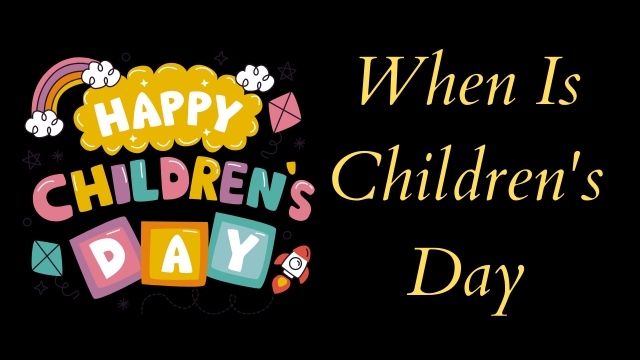When Is Children's Day
Read Also - New Style New Latest New Good Morning Images
Children's Day is a special occasion celebrated worldwide to honor and cherish the innocence, purity, and boundless potential of children. It is a day dedicated to recognizing the importance of childhood and advocating for the rights, well-being, and happiness of children everywhere. In this article, we'll explore the significance of Children's Day, its origins, how it is celebrated around the world, and why it holds such importance in society.
In many countries, Children's Day is linked to the birthday of prominent figures who championed children's rights or made significant contributions to child welfare. For example, in India, Children's Day is celebrated on November 14th, the birth anniversary of Jawaharlal Nehru, the country's first Prime Minister, who was known for his love and affection for children.
The significance of Children's Day goes beyond just a day of festivities; it serves as a reminder to society to nurture, protect, and empower its youngest members. It highlights the importance of providing children with love, care, education, and opportunities for growth and development.
Special Events and Activities: Schools, communities, and organizations often organize special events, performances, and activities for children on Children's Day. These may include talent shows, games, storytelling sessions, art and craft workshops, and educational programs focused on child rights and well-being.
Gifts and Treats: Children are often showered with gifts, treats, and surprises on Children's Day as a gesture of love and appreciation. Parents, family members, and caregivers may indulge children with toys, books, sweets, and other goodies to make them feel cherished and valued.
Charitable Initiatives: Children's Day also serves as an opportunity to raise awareness about the challenges faced by disadvantaged children and to support charitable initiatives aimed at improving their lives. Fundraisers, donation drives, and volunteer activities are common during this time, allowing people to contribute to the well-being of less fortunate children.
Educational Campaigns: Many organizations and advocacy groups use Children's Day as a platform to raise awareness about children's rights, safety, health, and education. Through workshops, seminars, and awareness campaigns, they empower parents, caregivers, and communities to create nurturing environments where children can thrive.
Family Time: Children's Day encourages families to spend quality time together, strengthening bonds and creating lasting memories. Whether it's a picnic in the park, a movie night at home, or a fun outing to a zoo or amusement park, families use this day to connect, play, and enjoy each other's company.
Childhood is Precious: Children's Day reminds us that childhood is a precious and fleeting stage of life that deserves to be cherished and protected. It celebrates the innocence, purity, and joy of childhood, encouraging adults to nurture and safeguard these qualities in children.
Advocacy for Children's Rights: Children's Day serves as a platform to advocate for the rights of children, including the right to education, health care, protection from exploitation and abuse, and opportunities for play and recreation. It raises awareness about the challenges that children face and mobilizes support for initiatives aimed at addressing them.
Investment in the Future: By investing in the well-being, education, and development of children, we are investing in the future of society. Children are the future leaders, innovators, and change-makers, and Children's Day underscores the importance of providing them with the necessary resources and opportunities to fulfill their potential.
Promotion of Family Values: Children's Day promotes family values and strengthens the bond between parents, children, and extended family members. It encourages families to prioritize spending time together, fostering love, communication, and mutual respect.
Cultural Heritage: Children's Day is deeply rooted in cultural traditions and customs, reflecting the values and beliefs of different societies. It provides an opportunity for people to celebrate their cultural heritage and pass down traditions from one generation to the next.


